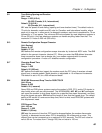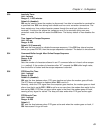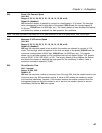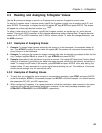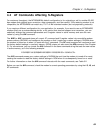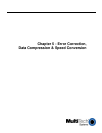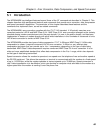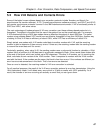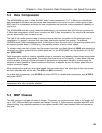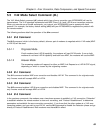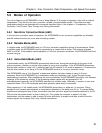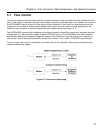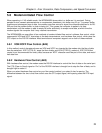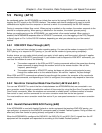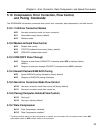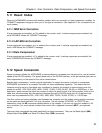
68
Chapter 5 - Error Correction, Data Compression, and Speed Conversion
5.3 Data Compression
The MT2834MR6 has both V.42bis and MNP class 5 data compression. ITU-T V.42bis is an international
data compression standard that can provide data compression of up to four to one in certain types of data.
MNP class 5 is a proprietary technique for data compression that provides a data compression capability of
two-to-one.
The MT2834MR6 must be in error correction mode before it can compress data (LAP-M error correction for
V.42bis data compression or MNP error correction for MNP 5 data compression). By using the
#L
command,
you can select which error correction to use.
The type of file transfer protocol used to send and receive data has a big effect on the speed gain due to
compression. In general, a protocol that uses large data blocks transfers files quicker. For example,
YMODEM sends 1000 characters per block. It also helps to have the serial port of the receiving modem set to
the highest possible speed (115,200 bps), if the sending modem is set to a lower speed.
To achieve a data rate that is higher than the modem baud rate, turn Baud Adjust off (
$BA0
) and operate the
serial port at a higher speed than the modem baud rate. For the MT2834MR6, set the serial port to 115,200
bps (
$SB115200
).
Data compression works by locating repeated strings of characters and repeating these strings using shorter
codewords. To use data compression, the modem must to be driven at full capacity. In other words, the data
must be present at enough volume and speed to get maximum compression benefits, as when using file
transfers or batch operations. Speed conversion must be on to operate the port at a higher speed than the
modem connection speed.
When operating the serial port at a higher speed than the modem baud rate, some type of flow control must
be used, otherwise data can be lost. (See
&E4
and
&E5
commands.)
To enable data compression, type AT&E15 and press ENTER; to disable data compression, type AT&E14
and press ENTER.
Note: For data compression to take place, both the answer and the originate modems must have data
compression and error correction enabled.
5.4 MNP Classes
The MNP protocol is divided into several classes. The classes you might encounter today in full duplex dial-
up in 1200, 2400 and 9600 bps modems are Classes 3 through 5. When modems equipped with MNP start
communicating, they negotiate operation to the highest common MNP class between them and operate at
that level.



